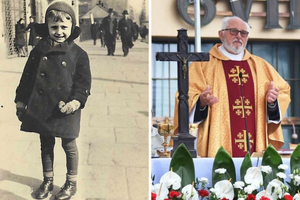Clericalism? No! Priestliness? Yes!
COMMENTARY: The call from Jesus to loving, humble, selfless, joyful service is spoken to all who dare to be His disciple!

The word so often repeated, always, rightly, with scorn — at the recently completed synod, was clericalism. This tumor on the Mystical Body of Christ was frequently anathematized by many, from Pope Francis on.
And rightly so. Clericalism is a sin, a vice, a sad historical tendency in the Church that must be always resisted.
What is it? Well, clericalism is the belief that priests and bishops should have prerogatives, privileges and entitlements, and that they should be treated as nobility with a clout and authority that demands deference and obedience. Clericalism also applies to an excessive intrusion of the Church into political and cultural matters. These are rightly to be condemned.
Let’s be clear: Clericalism is toxic to the Church; it is contrary to the teaching of Jesus and His saints; it is a constant bogeyman in the teaching of Pope Francis — and should be — and was ceaselessly scourged at the synod. Good!
Two points, though.
First, while clericalism is a sin and a vice, priestliness is a virtue. A priest is not nobility, but, be sure, has a noble calling, as do so many other vocations. The Church calls him to treat his priestly vocation with care, dignity, vigilance. While never “set above” his people, and daily walking with them in struggles and suffering, he is “set apart” a bit, as Jesus called His apostles and set them apart from His disciples. To love, appreciate, and respect priests is a constant virtue of Catholics, one innate in our Catholic culture. A priest inspires trust. His people call him “Father” and love him for that. Priestliness is the virtue that guards that vocation. It inspires a life of selfless service, and a sense of custody, like a man will protect his identity and duty as a husband and dad, with a decorum to guard that. No more clericalism! More priestliness!
Secondly, about the same time clericalism was tagged in 18th- and 19th-century Europe, yet another curse arose: laicism. This was a raw vitriol against bishops, priests, the Church, and any respect shown to the Catholic faith, especially in ministries of education, charity, and health care. Its influence is still potent in many countries and is on the rise in our secular world.
So, not just priests, but laypeople, the government, and influencers in culture can misuse their positions to impose their will harshly upon others! And even lay leaders and religious in the Church can adopt an authoritarian and arrogant attitude in their ecclesial duties. You don’t think so? Read my mail!
The call from Jesus to loving, humble, selfless, joyful service is spoken to all who dare to be His disciple! Violations of this imperative sure can happen among priests and bishops, but also among lay faithful, deacons, and religious. Perhaps we need to remember that sometimes we notice the mote in another’s eye and miss the beam in our own!

















